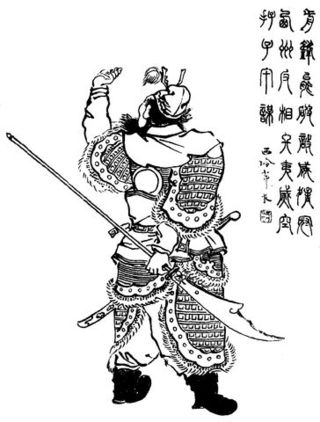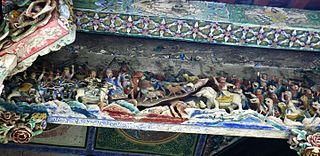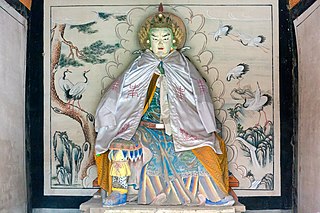
Jiang Wei, courtesy name Boyue, was a military general of the state of Shu during the Three Kingdoms period of China. Born in Ji County, Jiang Wei started his career as a military officer in his native Tianshui Commandery, which was a territory of Wei. In 228, when Wei's rival state Shu launched an invasion led by Zhuge Liang, Jiang Wei was distrusted by Ma Zun, then administrator of Tianshui Commandery. As such, Jiang Wei had to defect to Shu. Zhuge Liang, the Imperial Chancellor and regent of Shu, highly regarded Jiang Wei and appointed him as a general in Shu. After Zhuge Liang's death in 234, Jiang Wei continued serving as a military commander during the regencies Jiang Wan and Fei Yi, eventually rising to the highest military rank of General-In-Chief (大將軍) after Fei Yi's death in 253. Between 240 and 262, he continued Zhuge Liang's legacy of waging war against Wei by leading another 11 military campaigns. However, Jiang Wei's campaigns were relatively constrained in terms of both scale and duration due to Shu's limited resources and inadequate food supplies, as well as internal political faultlines. In 263, when Wei launched a massive invasion of Shu, Jiang Wei led Shu forces to resist the invaders at Tazhong, Yinping and Jiange, himself defending Jiange which was under Zhong Hui's attack. While Jiang Wei managed to temporarily stall Wei's main force led by Zhong Hui, Deng Ai, another military commander of Wei, took a shortcut via Yinping and showed up at Chengdu unexpectedly. Liu Shan surrendered to Deng Ai without putting up resistance and ordered Jiang Wei to surrender to the Wei general Zhong Hui; this event marked the end of Shu's existence. In the following year, Jiang Wei instigated Zhong Hui to launch a rebellion in Chengdu against the Wei regent Sima Zhao and hoped to use the opportunity to gain military power and restore Shu. However, some of Zhong Hui's officers were unwilling to participate in the rebellion and started a mutiny, killing Jiang Wei and Zhong Hui.

Zhuge Liang, courtesy name Kǒngmíng was a Chinese military engineer, strategist, politician, and writer. He was chancellor and later regent of the state of Shu Han during the Three Kingdoms period. He is recognised as the most accomplished strategist of his era, and has been compared to Sun Tzu, the author of The Art of War. His reputation as an intelligent and learned scholar grew even while he was living in relative seclusion, earning him the nickname "Wolong" or "Fulong", meaning "Crouching Dragon" or "Sleeping Dragon". Zhuge Liang is often depicted wearing a Taoist robe and holding a hand fan made of crane feathers.

Zhang He, courtesy name Junyi, was a military general serving under the warlord Cao Cao in the late Eastern Han dynasty of China. He continued serving in the state of Cao Wei under its first two rulers, Cao Pi and Cao Rui, during the Three Kingdoms period until his death.

Ma Su (190–228), courtesy name Youchang, was a military general and strategist of the state of Shu Han in the Three Kingdoms period of China. Ma Su had conspicuous talent in military theories and was admired by the Shu chancellor Zhuge Liang. However, a tactical blunder by Ma Su at the Battle of Jieting resulted in Shu being dealt a huge defeat by Zhang He, a general of the rival state of Wei. He was a younger brother of Ma Liang.

Wei Yan, courtesy name Wenchang, was a Chinese military general and politician of the state of Shu Han during the Three Kingdoms period of China. Originally a subordinate of the warlord Liu Bei in the late Eastern Han dynasty, Wei Yan rose through the ranks and became a general when Liu Bei seized control of Yi Province in 214. His performance in battle helped him to become a prominent figure in the Shu military in a short period of time. He was later appointed as the Administrator of Hanzhong Commandery and as an Area Commander in 219. Between 228 and 234, he participated actively in the Northern Expeditions led by the Shu regent Zhuge Liang against Shu's rival state, Cao Wei. After Zhuge Liang's death in c.September 234, Wei Yan was killed by another Shu general, Ma Dai, for alleged treason.

Zhuge Liang's Southern Campaign, also known as the War of Pacification in Nanzhong, was a military campaign which took place in 225 during the early Three Kingdoms period (220–280) of China. It was led by Zhuge Liang, the Imperial Chancellor of the state of Shu Han, against opposing forces in the Nanzhong region. The campaign was a response to rebellions started by local governors in the Nanzhong region and intrusions by the Nanman.

Zhuge Liang's Northern Expeditions were a series of five military campaigns launched by the state of Shu Han against the rival state of Cao Wei from 228 to 234 during the Three Kingdoms period in China. All five expeditions were led by Zhuge Liang, the Imperial Chancellor and regent of Shu. Although they proved unsuccessful and ended up as a stalemate, the expeditions have become some of the best known conflicts of the Three Kingdoms period and one of the few battles during it where each side fought against each other with hundreds of thousands of troops, as opposed to other battles where one side had a huge numerical advantage.

Jiang Wan, courtesy name Gongyan, was a regent and military general of the state of Shu during the Three Kingdoms period of China. Born in the late Eastern Han dynasty, Jiang Wan initially served as a scribe, county chief and county prefect under the warlord Liu Bei, who later became the founding emperor of Shu. After Liu Bei's son Liu Shan succeeded his father as emperor in 223, Jiang Wan gradually rose to prominence under the regency of Zhuge Liang, the Imperial Chancellor of Shu. Between 228 and 234, while Zhuge Liang was away leading Shu forces on the Northern Expeditions against Shu's rival state Wei, Jiang Wan took charge of internal affairs and provided logistical support to the Shu forces at the frontline. After Zhuge Liang's death in 234, Jiang Wan succeeded him as regent and did well in gaining the Shu people's confidence and leading them into a post-Zhuge Liang era. During this time, he considered that the land-based route through the Qin Mountains used by Zhuge Liang during the Northern Expeditions was too difficult for navigation and transportation of supplies. He thus came up with a plan to switch to a water-based route along the Han River targeting Wei territories in present-day southern Shaanxi and northwestern Hubei. However, the Shu government rejected his plan as they thought it was too risky. In 243, due to poor health, Jiang Wan relocated from Hanzhong near the Wei–Shu border to Fu County. Towards the final years of his regency, as his health worsened, Jiang Wan gradually relinquished his powers to his deputies Fei Yi and Dong Yun but he continued to rule as regent in name. He died in 246 and was succeeded by Fei Yi.
Li Yan, courtesy name Zhengfang, also known as Li Ping, was a military general of the state of Shu Han during the Three Kingdoms period of China. He climbed to the zenith of his career when he was asked by the Shu emperor Liu Bei to be the military paramountcy and co-regent alongside Zhuge Liang for his son and successor, Liu Shan. After the death of Liu Bei, Li Yan was given the rank of General of the Vanguard which was last held by Guan Yu back in 220. Li served most of his career in the mid and late 220s as the area commander for the Eastern Front centered in Yong An with Chen Dao as his deputy; he never faced any major battles in his position. However, during the 230s and the 4th of Zhuge Liang's Northern Expeditions, Li Yan was given a higher rank of General of the Agile Cavalry, below only Zhuge Liang. He was assigned to handle logistics, but he was unable to deliver supplies to Zhuge Liang's army in a timely manner. After his attempt to fraudulently cover his inability to follow commands, Li Yan was stripped from positions and power.
Guo Huai, courtesy name Boji, was a military general of the state of Cao Wei during the Three Kingdoms period of China. He started his career towards the end of the Eastern Han dynasty under the warlord Cao Cao as a subordinate of Cao Cao's generals Xiahou Yuan and Zhang He. During the Three Kingdoms period, he served in Wei, the state established by Cao Cao's son Cao Pi, and lived through the reigns of four Wei emperors. From the 220s until his death in 255, he governed and defended Wei's western borders in Yong and Liang provinces. During this time, he resisted multiple invasions by Wei's rival state, Shu Han, and quelled some rebellions by local Qiang, Di and other non-Han Chinese tribes.
Chen Shi was a military officer of the state of Shu Han in the Three Kingdoms period of China. He previously served under the warlord Liu Bei in the late Eastern Han dynasty. His name is sometimes recorded as Chen Jie.
Xiang Lang (160s-247), courtesy name Juda, was an official and scholar of the state of Shu Han during the Three Kingdoms period of China. He previously served under the warlords Liu Biao and Liu Bei in the late Eastern Han dynasty. In 243, Xiang Lang resigned and spent the remaining years of his life reading, writing, proofreading and editing various classical texts. By the time of his death in 247, he was one of the foremost book collectors of his time and a major source of influence for many later scholars. He was an uncle of the Shu general Xiang Chong.

Yang Yi, courtesy name Weigong, was an official of the state of Shu Han in the Three Kingdoms period of China.

The Battle of Wuzhang Plains was fought between the contending states of Cao Wei and Shu Han in 234 AD during the Three Kingdoms period of China. The battle was the fifth and last of a series of Northern Expeditions led by Shu's chancellor, Zhuge Liang, to attack Wei. Zhuge Liang fell ill and died during the stalemate and subsequently the Shu forces retreated.

Ma Zhong, courtesy name Dexin, originally named Hu Du, was a military general of the state of Shu Han during the Three Kingdoms period of China. Liu Bei was quite impressed by Ma Zhong and praised him highly, comparing him to the recently defected Huang Quan, Ma Zhong was trusted and respected by the following head of the government Zhuge Liang, Jiang Wan and Fei Yi. After Liu Bei's death, he served under Zhuge Liang during the Southern Campaign and helped to quell the rebellion. He was appointed as the area commander in the south after Li Hui's death. He spends most of his life pacify the region and protecting the people of the south often with the help of Zhang Ni. Ma Zhong was known as a generous and whimsical man but he was also decisive in handling affairs. Hence the southern tribes both feared him and respected him. His duty in the south could be comparable to Wang Ping in the north and Deng Zhi in the east. After his death, the foreigners sorely missed him and later established a temple in his honor.

Zhang Yi, courtesy name Bogong, was a military general of the state of Shu Han during the Three Kingdoms period of China. Born in the late Eastern Han dynasty, Zhang Yi was a 10th-generation descendant of Zhang Liang. He started his career as a scribe under the warlord Liu Bei, who founded Shu later, and gradually rose to the positions of a county prefect and commandery administrator. In the early 230s, he served as an area commander tasked with maintaining the peace in Shu's southern commanderies. In 234, he led the Shu vanguard during the Battle of Wuzhang Plains against Shu's rival state Wei. From 238 to 259, Zhang Yi steadily rose through the ranks to become one of Shu's top generals. During this time, although he strongly opposed the Shu general Jiang Wei's aggressive stance towards Wei, he still accompanied Jiang Wei on his military campaigns against Wei. In 263, he surrendered to Wei forces along with the Shu emperor Liu Shan when Wei launched a large-scale invasion of Shu. In the following year, Zhang Yi was killed by mutineers during a rebellion by the Wei general Zhong Hui. Like Liao Hua and Zong Yu, Zhang was one of few officials who served the Shu-Han state throughout its entire existence.
Jiang Wei's Northern Expeditions refer to a series of eleven military campaigns launched by the state of Shu Han against its rival state, Cao Wei, between 240 and 262 CE during the Three Kingdoms period in China. The campaigns were led by Jiang Wei, a prominent Shu general. Unlike the previous Northern campaigns led by Zhuge Liang, which added Wudu and Yinping commanderies to Shu Han state territories, Jiang Wei's campaigns ended up being unpopular in both the military and civil circles in Shu. Also unlike Zhuge Liang's campaigns which often featured 60,000 to sometimes even 100,000 Shu Troops, Jiang Wei's were often much smaller rarely exceeding 30,000 even after the death of Fei Yi, where Jiang Wei assumed control of the military. The Zhuge Liang campaigns did suffer from logistical and supply issues for their large army. Zhuge's successor Jiang Wan, believed that it was the Hanzhong's mountainous terrain itself that were to blame for the campaigns failures and attempted to switch the route thru the Han river. Fei Yi, who succeeded Jiang Wan, agreed, and never allowed any large campaigns to be launched by Hanzhong. Jiang Wei however overlooked these concerns and used Hanzhong as his home base as Zhuge Liang did.

The Conquest of Shu by Wei was a military campaign launched by the dynastic state of Cao Wei against its rival Shu Han in late 263 during the Three Kingdoms period of China. The campaign culminated in the fall of Shu Han and the tripartite equilibrium maintained in China for over 40 years since the end of the Eastern Han dynasty in 220. The conquest laid the foundation for an eventual reunified China under the Western Jin dynasty in 280.

The Battle of Mount Qi was a military conflict which took place around Mount Qi between the states of Cao Wei and Shu Han in 231 during the Three Kingdoms period of China. It was also the most vigorous of the five Shu invasions of Wei, resulting in thousands of deaths on both sides. Although Zhuge Liang was able to make significant achievement in the beginning of the battle, the battle finally concluded with a strategic Wei victory due to the insufficient food supply for the Shu Han army. The insufficient food supply was caused by heavy rain and mistakes made by Li Yan. The Shu regent, Zhuge Liang, spent three years recuperating before launching another invasion on Wei in 234.
The Ziwu Campaign was a military counter offensive launched in 230 by the state of Cao Wei against his rival state Shu Han during the Three Kingdoms period of China. The campaign was initiated by Wei's Grand Marshal, Cao Zhen following the numerous Northern Expeditions and more recently the battle of Jianwei.














